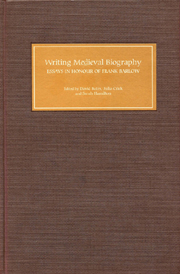Book contents
- Frontmatter
- Contents
- Preface
- List of Abbreviations
- Introduction
- 1 Did Charlemagne have a Private Life?
- 2 Bones for Historians: Putting the Body back into Biography
- 3 ‘Carriers of the Truth’: Writing the Biographies of Anglo-Saxon Female Saints
- 4 Alfred and his Biographers: Images and Imagination
- 5 Re-Reading King Æthelred the Unready
- 6 Writing the Biography of Eleventh-Century Queens
- 7 The Flemish Contribution to Biographical Writing in England in the Eleventh Century
- 8 The Conqueror's Earliest Historians and the Writing of his Biography
- 9 Secular Propaganda and Aristocratic Values: The Autobiographies of Count Fulk le Réchin of Anjou and Count William of Poitou, Duke of Aquitaine
- 10 Reading the Signs: Bernard of Clairvaux and his Miracles
- 11 Arnulf's Mentor: Geoffrey of Léves, Bishop of Chartres
- 12 The Empress Matilda as a Subject for Biography
- 13 The Gesta Stephani
- 14 Writing the Biography of Roger of Howden, King's Clerk and Chronicler
- 15 Writing a Biography in the Thirteenth Century: The Construction and Composition of the ‘History of William Marshal’
- 16 The Strange Case of the Missing Biographies: The Lives of the Plantagenet Kings of England 1154–1272
- Index
5 - Re-Reading King Æthelred the Unready
Published online by Cambridge University Press: 12 September 2012
- Frontmatter
- Contents
- Preface
- List of Abbreviations
- Introduction
- 1 Did Charlemagne have a Private Life?
- 2 Bones for Historians: Putting the Body back into Biography
- 3 ‘Carriers of the Truth’: Writing the Biographies of Anglo-Saxon Female Saints
- 4 Alfred and his Biographers: Images and Imagination
- 5 Re-Reading King Æthelred the Unready
- 6 Writing the Biography of Eleventh-Century Queens
- 7 The Flemish Contribution to Biographical Writing in England in the Eleventh Century
- 8 The Conqueror's Earliest Historians and the Writing of his Biography
- 9 Secular Propaganda and Aristocratic Values: The Autobiographies of Count Fulk le Réchin of Anjou and Count William of Poitou, Duke of Aquitaine
- 10 Reading the Signs: Bernard of Clairvaux and his Miracles
- 11 Arnulf's Mentor: Geoffrey of Léves, Bishop of Chartres
- 12 The Empress Matilda as a Subject for Biography
- 13 The Gesta Stephani
- 14 Writing the Biography of Roger of Howden, King's Clerk and Chronicler
- 15 Writing a Biography in the Thirteenth Century: The Construction and Composition of the ‘History of William Marshal’
- 16 The Strange Case of the Missing Biographies: The Lives of the Plantagenet Kings of England 1154–1272
- Index
Summary
THERE ARE several Anglo-Saxon kings who warrant and could sustain the full-scale biographical treatment: Alfred, of course; Æthelstan and Edgar, if one were not to be pressed too hard for the personal dimension; and Æthelred, Cnut, and Edward the Confessor, all allowing plenty of scope for the exercise of a fecund historical imagination. It would be only fair to add Queen Emma, as another figure of exceptional interest and importance. In most of these cases, there is just about enough material to draw together, and then to play with, and even a hint of the subject's personality. Of course we have to accept the limitations of the exer- cise, imposed upon us by the lack of adequate source material, and we must heed the words of one of the most renowned practitioners of the genre of medieval biography. As Professor Barlow said in connection with King Edward the Confessor, ‘we have to scrape the barrel with care: every scrap of information is precious’; and, as he went on to say, the historian ‘has to steer between bland assurance, for which he has no warrant, and complete scepticism, which denies his craft’. I marked that passage as an undergraduate; and it remains the craft in which I am most interested.
I shall speak mainly from the recent experience of having written an account of Edward's father, King Æthelred the Unready, for the Oxford Dictionary of National Biography.
- Type
- Chapter
- Information
- Writing Medieval Biography, 750–1250Essays in Honour of Frank Barlow, pp. 77 - 98Publisher: Boydell & BrewerPrint publication year: 2006



